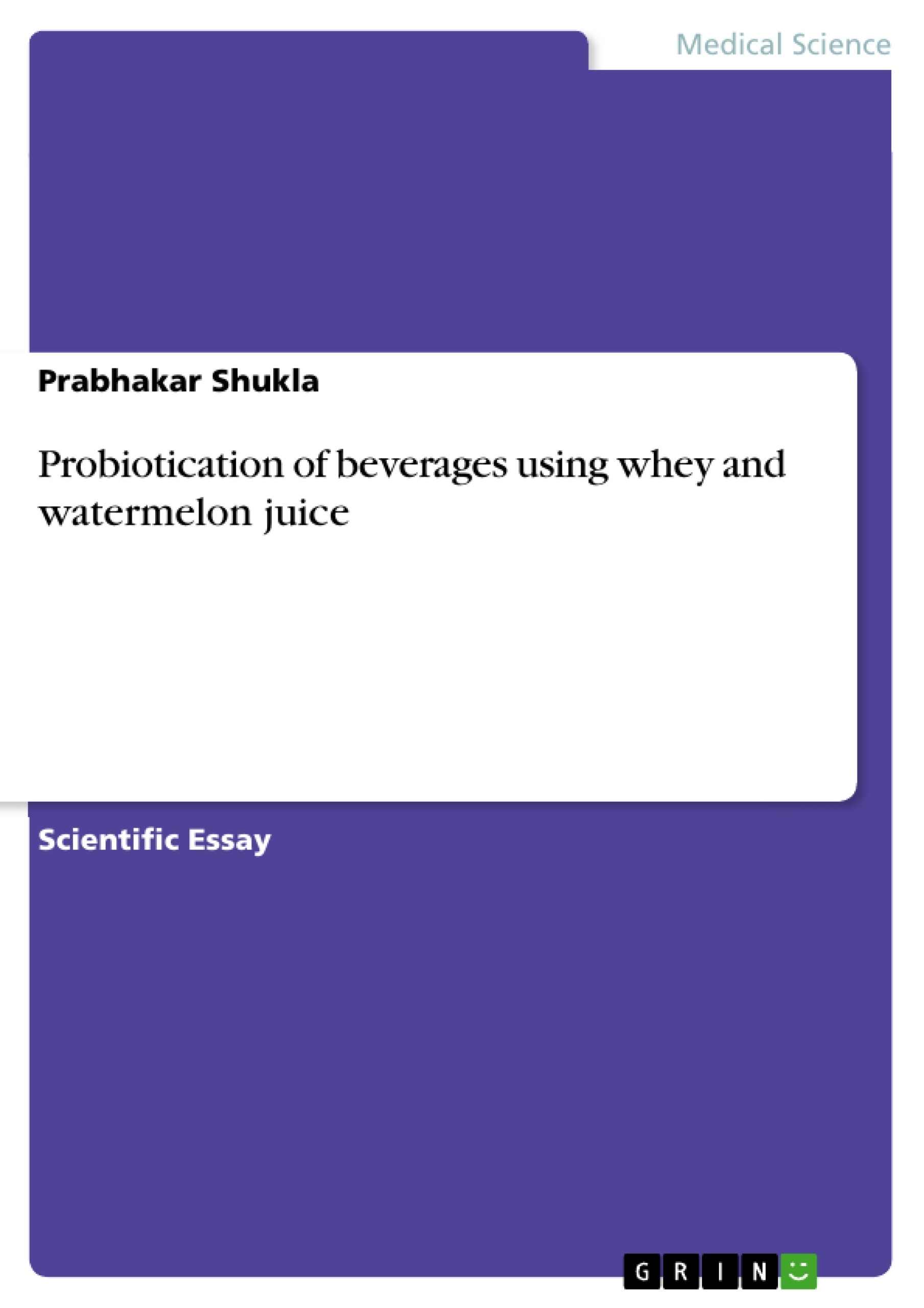The aim of this study was to develop a probiotic beverage using whey and Watermelon juice Lactobacillus acidophilus was used as the probiotic organism. Optimization of the probiotic watermelon beverage as well as the establishment of a sensory profile by using chemical, microbiological, and quantitative descriptive analysis. For best blend optimization, we used RSM 6.0 trial software. Fermentation time using 1 per cent inoculum of L. acidophilus was optimized on the basis of RSM trial version, The 65:35 blend ratio of whey and watermelon juice fermented for 24 hrs. gave desirable results with highest sensory scores for overall acceptability and a total viable count of more than 106 cfu ml-1.beverage kept for 20 days below refrigerated temp and 120 hrs. at ambient temperature for the analysis for sensory and changes in titrable acidity, pH, total viable count.
Inhaltsverzeichnis (Table of Contents)
- INTRODUCTION
- MATERIAL AND METHOD
- COLLECTION OF MILK SAMPLE & SEPARATION OF WHEY
- FORMULATION OF DEVELOPED BEVERAGE
- INOCULUMS PREPARATION
- PROBIOTIC BEVERAGE PREPARATION
- FERMENTATION
- STORAGE
- ANALYTICAL METHOD
- STATISTICAL ANALYSIS
- RESULT AND DISCUSSION
- EXPERIMENTAL DESIGN
- ADEQUACY OF MODELS FOR DIFFERENT REFERENCES
- RESPONSE SURFACES DEVELOPED TO OBSERVE THE EFFECT OF PROCESS PARAMETERS ON RESPONSE PARAMETERS
- OPTIMIZATION OF GROWTH CONDITIONS FOR LACTOBACILLUS ACIDOPHILUS IN PROBIOTIC BEVERAGE DEVELOPMENT
- CONCLUSION
- REFERECES
Zielsetzung und Themenschwerpunkte (Objectives and Key Themes)
This study aims to develop a probiotic beverage utilizing whey and watermelon juice, with Lactobacillus acidophilus as the probiotic organism. The research focuses on optimizing the blend of whey and watermelon juice for optimal sensory characteristics and establishing a sensory profile through chemical, microbiological, and quantitative descriptive analysis. The study also aims to investigate the storage stability of the probiotic beverage.
- Development of a probiotic beverage using whey and watermelon juice.
- Optimization of the beverage blend for sensory characteristics.
- Establishment of a sensory profile using chemical, microbiological, and quantitative descriptive analysis.
- Investigation of the storage stability of the probiotic beverage.
- Evaluation of the nutritional and functional properties of the developed beverage.
Zusammenfassung der Kapitel (Chapter Summaries)
The introduction provides a comprehensive overview of probiotic foods and their growing market share, highlighting the importance of probiotics in health and their diverse applications. It discusses the potential benefits of probiotics in food and agricultural applications, including the selection of new probiotic strains and the development of novel applications.
The materials and methods section details the procurement of ingredients and materials used in the beverage development process, outlining the procedures for milk collection, whey separation, beverage formulation, inoculums preparation, probiotic beverage preparation, fermentation, storage, and analytical methods.
The results and discussion section focuses on the optimization of the beverage formulation using Response Surface Methodology (RSM) with a central composite design (CCD). The study examines the effects of various factors such as watermelon juice, stabilizer, and sucrose on the consistency, color and appearance, flavor, and overall acceptability of the beverage.
The section also analyzes the effect of fermentation time on the sensory characteristics of the beverage and investigates the storage stability of the probiotic beverage under different temperature conditions.
Schlüsselwörter (Keywords)
The main keywords and focus topics of this research are: Whey, Probiotic beverage, watermelon whey beverage, and Storage stability. The study focuses on the development and optimization of a probiotic beverage using whey and watermelon juice, emphasizing the importance of sensory characteristics and storage stability for successful product development.
Frequently Asked Questions
What is the main objective of this study?
The study aims to develop and optimize a probiotic beverage using a blend of whey and watermelon juice, specifically using Lactobacillus acidophilus as the probiotic organism.
What is the optimal ratio of whey to watermelon juice found in the research?
The research identified a 65:35 blend ratio of whey and watermelon juice as optimal, providing the highest sensory scores and a viable probiotic count.
How long should the beverage be fermented?
According to the optimization results using RSM software, a fermentation time of 24 hours using a 1% inoculum of L. acidophilus yielded the best results.
What is the shelf life of the developed probiotic beverage?
The beverage remains stable for up to 20 days under refrigerated conditions and up to 120 hours at ambient temperature while maintaining its sensory and microbiological quality.
What is Response Surface Methodology (RSM) used for in this study?
RSM is used to statistically optimize the growth conditions and blend parameters to achieve the best sensory characteristics (flavor, color, appearance) and overall acceptability.
- Arbeit zitieren
- Prabhakar Shukla (Autor:in), 2014, Probiotication of beverages using whey and watermelon juice, München, GRIN Verlag, https://www.grin.com/document/281381



